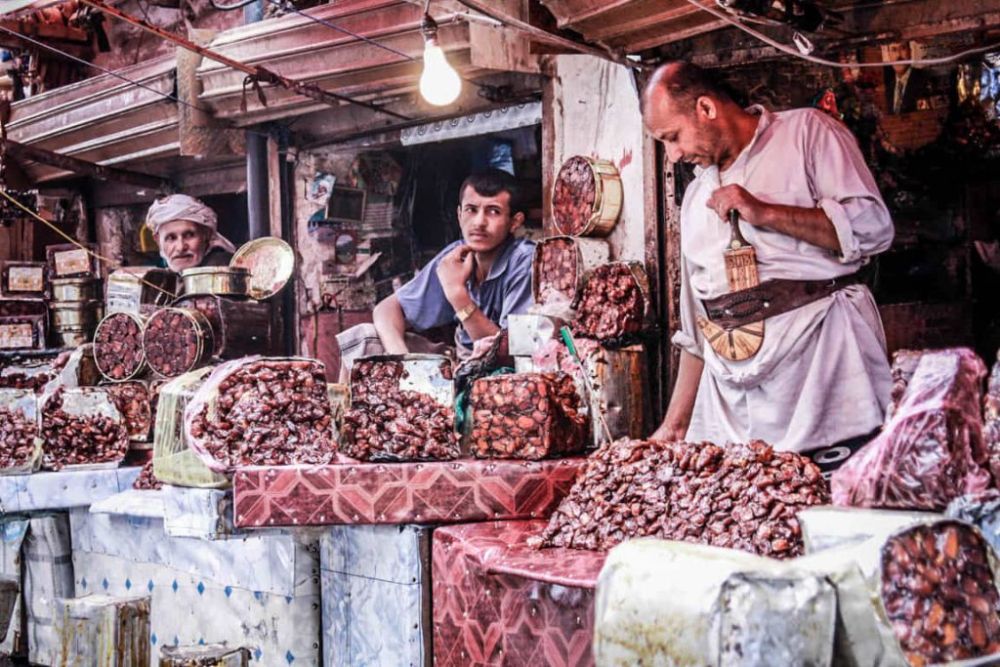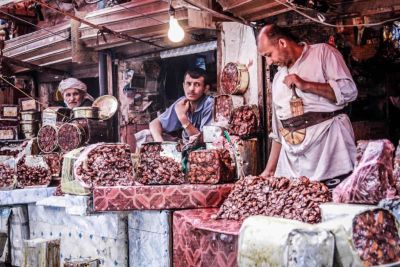

Bab al-Yemen, which translates to 'Gate of Yemen,' is an iconic entry point into Sana'a's old city, Suq al-Milh. It's a significant historical landmark that dates back to the Yemenite monarchy. Strolling through this ancient gate, you'll be transported into a bustling market scene where old-world charm meets a vibrant trading hub. Here, merchants sell everything from spices and textiles to handcrafted jewelry and traditional Yemeni artifacts. Moreover, the gate itself is an architectural marvel, reflecting the ancient Islamic design with intricate carvings and robust fortifications. A visit to Bab al-Yemen will afford you a glimpse into the past, an experience rich with cultural heritage and teeming with the daily life of locals. Don't forget to capture some memorable photographs of this iconic landmark and the souk's animated atmosphere.
Suq al-Milh, literally translating to 'Salt Market,' is a traditional market located in the heart of Sana'a's old city. This market is one of the oldest in the city and a must-visit spot for any traveler looking to experience the true essence of Yemeni culture. As you meander through the narrow alleyways, you'll find an array of vendors selling a diverse range of goods from local spices and salts to gold and silver items. The sounds of haggling, the rich aroma of spices, and the vibrant display of merchandise create a sensory overload that is quintessential to the Yemeni market experience. Visiting Suq al-Milh gives you the opportunity to brush shoulders with locals, try your hand at bargaining, and perhaps take home a unique souvenir or two. This teeming marketplace not only offers a lively shopping experience but also a chance to observe and participate in the everyday life of Sana'a.
Take a step back in time with a cultural walking tour of Old Sana'a, starting from Suq al-Milh. This UNESCO World Heritage site is filled with stunning examples of ancient Yemeni architecture, including multi-storied tower houses with distinctive qamariya windows. As you walk down the cobblestone streets, you'll be surrounded by over 6,000 houses that date back several hundred years. A walking tour in this part of the city provides a perfect way to embrace the rich history and culture of Yemen. Local guides tell captivating stories about Sana'a's past and explain the significance of the distinct architecture. This journey through narrow streets and hidden courtyards is an ideal way to get an intimate look at the local way of life. In addition to the architecture, you'll see mosques, bathhouses, and gardens, all while soaking in the atmosphere of this ancient city.
For a truly immersive experience in Suq al-Milh, attending a Yemeni cooking class is a delightful activity that combines culture with culinary exploration. Learn how to create traditional Yemeni dishes, such as Saltah, a meat stew typically served with flatbread, or Malawah, a multi-layered skillet bread. These classes are not just about cooking; they represent the heart of Yemeni hospitality and provide insights into the local lifestyle. Led by local chefs or home cooks, participants will have the opportunity to visit the market, choose fresh ingredients, and learn the secrets of authentic Yemeni flavors and spices. These cooking classes are not only informative but also hands-on and engaging. After the hard work, everyone sits together to enjoy the fruits of their labor—a communal meal that embodies the spirit of sharing that is central to Yemeni culture.
Sana'a's Old City, with its ancient buildings and bustling markets, is a dream for amateur and professional photographers alike. A photography tour through Suq al-Milh offers a unique opportunity to capture the essence of Yemeni life and architecture. With the assistance of a local guide, photo enthusiasts can discover the most picturesque spots and learn about the historical context of their surroundings. Guides also provide tips on how to respectfully photograph the local people and their crafts. This tour not only allows you to take home a collection of stunning images but also gives you a chance to observe the city through a different lens, focusing on beauty, color, and texture. Remember to bring your camera and extra batteries, as the captivating scenery and lively street life will provide ample photo opportunities from dawn till dusk.
Yemeni music and dance are integral parts of the country's cultural heritage, and attending a live performance can be a highlight of any visit to Suq al-Milh. Yemen has a rich tradition of music that includes both classical court music and vibrant folk dances. A visit to a local theater or cultural center gives you the chance to witness stunning performances of traditional Yemeni music, characterized by the use of the oud (a lute-like instrument), drums, and the human voice. Folk dances such as the baraa and the sharh are often performed in elaborate costumes and involve complex choreography that is rich in symbolism. These performances provide insight into the country's traditions and offer an enjoyable and unforgettable night out. It's an excellent way for visitors to experience the local culture and to support Yemeni artists.
Yemen has a storied history with coffee, claiming some of the earliest coffee cultivation in the world, and its traditional qishr (ginger coffee) and shaï (tea) are staples of local cuisine. Participating in a tea and coffee experience in Suq al-Milh allows visitors to taste these unique beverages and learn about their significance in Yemeni society. Local cafes and shops often host these experiences, where you can witness the preparation of qishr, a light and spiced coffee made from coffee husks, or sample different types of Yemeni tea, such as shaï with milk or shaï bil na'na' (mint tea). Informative sessions may include discussions about the history of Yemen's coffee industry and traditional serving methods, making this activity educational as well as delicious. This cozy experience will give you a moment to relax, savor the flavors, and chat with locals over a warm cup.
Engage with the artistic side of Yemeni culture by taking part in a crafting workshop in Suq al-Milh. Workshops can range from learning traditional Yemeni jewelry making to creating jambiyas (curved daggers) or even weaving textiles. These workshops provide a hands-on artistic experience, allowing visitors to understand the intricate workmanship that goes into every item crafted by local artisans. Under the careful guidance of master craftsmen, participants can learn about the materials and techniques used in traditional Yemeni crafts and create their own piece to take home. Not only is this a fun and educational activity, but it also supports the preservation of heritage crafts which are an essential aspect of Yemen's cultural identity. Check with local cultural centers or artisan guilds to find a workshop that intrigues you and immerse yourself in the world of Yemeni craftsmanship.
The Great Mosque of Sana'a, also known as Al-Jami' al-Kabir, is one of the oldest mosques in the world, dating back to the 7th century. It is a vital religious site, but it's also an embodiment of Islamic architecture and history. A visit to the mosque is a journey into the spiritual heart of Yemen. While the mosque is primarily a place of worship, non-Muslim visitors are sometimes permitted to enter and explore the site, but it's essential to check current accessibility and respect the cultural norms while visiting. The mosque's architecture, with its ancient minarets and prayer halls, offers an insiders' view of Yemen's Islamic heritage. The site also provides a quiet contrast to the lively markets outside, offering a peaceful respite and a chance for contemplation and appreciation of the deep cultural and historical roots of this magnificent edifice.
To fully appreciate the historical depth of Suq al-Milh, consider joining an antiquities and heritage tour. Such tours are tailored to showcase the ancient artifacts, traditional crafts, and the long-standing history of Sana'a's old city. You'll learn about the civilizations that have flourished here and their lasting impact on contemporary Yemeni society. As part of the tour, check out the antiquities shops where artifacts from various epochs are displayed and may be available for purchase. Ensure any artifacts bought are not of national importance and are legally sold to prevent the illicit trade of cultural heritage items. Additionally, you'll likely explore restored homes that demonstrate historical living conditions, observe traditional craftspeople at work, and visit museums or galleries that document the city's past. This educational excursion is a beautiful way to show respect for Yemen's heritage and to learn more about its complex history.
